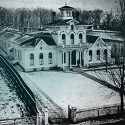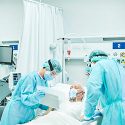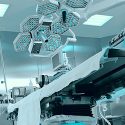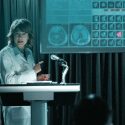About FLS
About FLS
Improving skills training for surgical residents and medical students intending surgical careers is a national priority. The skills of a surgeon are assessed at many points during a career. These assessments are largely subjective and technical competence is never directly measured. This is a significant barrier to improved skill training and higher competence levels.
Fundamentals of Laparoscopic Surgery (FLS), a national certification initiative for laparoscopic skill and knowledge, is an example of a program using objective criteria for skill training outcomes. FLS training is now the obligation of every surgical residency (and will most likely become an obligation of medical schools to their students seeking surgical residencies).
The Department’s Surgical Skills and Simulation Laboratory is an official test center for surgeons interested in becoming certified in FLS. The Laboratory has been certified as a test center since 2007 and currently has two FLS certified testing proctors and an FLS surgical champion within the Department of Surgery. Over 100 surgeons and general surgery residents have been certified through our test center.
Surgical Skills and Simulation Laboratory
The Surgical Skills and Simulation Laboratory is conveniently located in the Department of Surgery offices in the Harper Professional Building. The laboratory space is divided into a 700 sq. ft. room divided into a hands-on simulation training area and benchtop work station, and an adjacent 500 sq. ft. room simulation training room which houses a computer and open surgical skills work station desktop area. The larger training area includes 2 FLS trainer boxes, 2 SurgicalSim VR virtual laparoscopic trainers, SurgicalSim LTS laparoscopic trainer, Accutouch endoscopy simulator trainer, and a 2 person surgical skills benchtop work station.
A second surgical skills and simulation training laboratory space being utilized for training is located in the Skills Task and Training room at the Kado Learning Center located within the Mazurek Educational Commons. The Skills Task and Training facility is comprised of a main room with 12 portable 2-person workstations designed for training on open surgical skills and procedural skill tasks. An adjacent but separated area, potentially serving as a second training area from the main training area, is currently being used for laparoscopic simulation training. This side area is aptly named the Laparoscopic Training Corridor as it holds four FLS trainer boxes and three METI SurgicalSim VR simulator trainers.
Surgical Skills and Simulation Training
Various materials and models support our simulation teaching concepts for a wide range of basic surgical skills, intermediate skill tasks, and more advanced surgical procedures. This includes basic knot tying and suturing, forcep handling and needle driver manipulation, surgical instrumentation recognition and categorization, incision creation, basic and advanced wound closure techniques, diagnostic and therapeutic ultrasound techniques, performance of intestinal anastomosis and vascular surgical arterial and venous repairs and anastomoses.
Specific surgical skills and simulation teaching and training modules have been developed for all open skills modules. The curricula for each module a didactic syllabus covering the appropriate knowledge domains necessary for developing expertise in the skill task being taught, procedural checklist of skill task steps, hands-on expert demonstration, practice guideline recommendations, and assessment of competency utilizing procedural checklists, task completion times, and global rating scores.
The Surgical Skills and Simulation Laboratory utilizes 7 FLS trainer boxes to train general surgery residents and medical students in basic laparoscopy skills. The trainer boxes are located in two areas on campus. Two trainer boxes are located in the Department of Surgery Surgical Skills and Simulation Laboratory in the Harper Professional Building and 5 box trainers are situated in the Skills Task and Training room at the Kado Learning Center located within the Mazurek Educational Commons.
The goals of the FLS educational module are to improve the clinical care of patients undergoing laparoscopic surgery by enhancing knowledge base and technical skills, provide a hands-on skills training component and validated assessment tool designed to teach the physiology, fundamental knowledge and technical skills required in basic laparoscopic surgery, to ensure competency in basic laparoscopy skills while setting minimal standards for these skills.
The assessment of competence is determined through a cognitive examination using a 80 question multiple-choice test examination and a hands-on skills examination consisting of 5 manual skills tasks. The cognitive examination is based upon four components; preoperative considerations, intraoperative considerations, basic laparoscopic procedures, and postoperative considerations. The hands-on skills examination is comprised of 5 manual skills tasks; peg transfer, precision pattern cutting, ligating loop placement, extracorporeal knot tying, and intracorporeal knot tying.
SurgicalSim VR (METI) is a learning system displaying a virtual reality fixed camera view. The simulation training exercises within this educational platform cover basic, intermediate, and advanced laparoscopic skill tasks including laparoscopic camera navigation (visualize target and scope, visualize and acquire target and scope, tissue and instrumentation manipulation (retract tissue, retract and dissect tissue, traverse tube, arrow placement, retraction and clip application, gallbladder dissect), basic suturing (needle adjust, one-handed and two-handed stitch-traction or no traction), advanced suturing (abstract and realistic square, surgeon and free knot, abstract and realistic continuous and interrupted suture). There is no haptic feedback to the instruments but rather virtual visual feedback is provided from sophisticated anatomic simulations. This program can objectively measure performance, identify problem areas, assess an individual learner’s progress, and ensure competency standards are met and mastered.
Certification and Testing
The Department’s Surgical Skills and Simulation Laboratory is an official test center for surgeons interested in becoming certified in FLS. The Laboratory has been certified as a test center since 2007 and currently has two FLS certified testing proctors and an FLS surgical champion within the Department of Surgery. Over 100 surgeons and general surgery residents have been certified through our test center.
Certification testing appointments at our center scheduled via on-line through web-based FLS testing schedules.
To find out more about our Surgical Skills and Simulation Laboratory and FLS testing center please call: (313) 745-0462 or Fax (313) 745-1873.
Answers to general questions about the FLS program can be found at www.flsprogram.org and www.sages.org.








